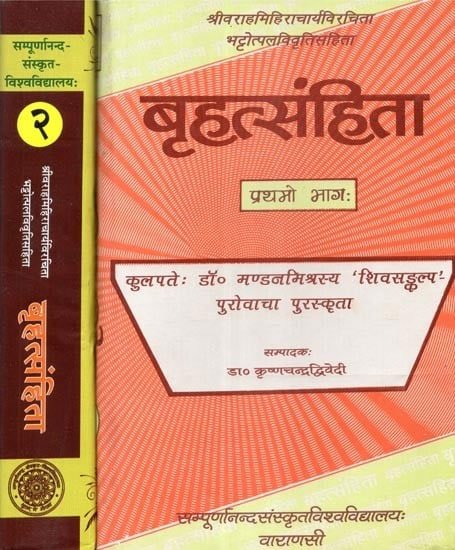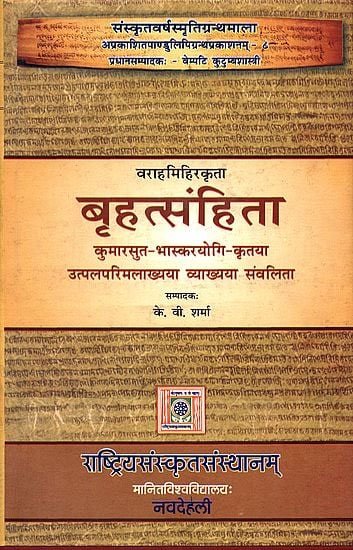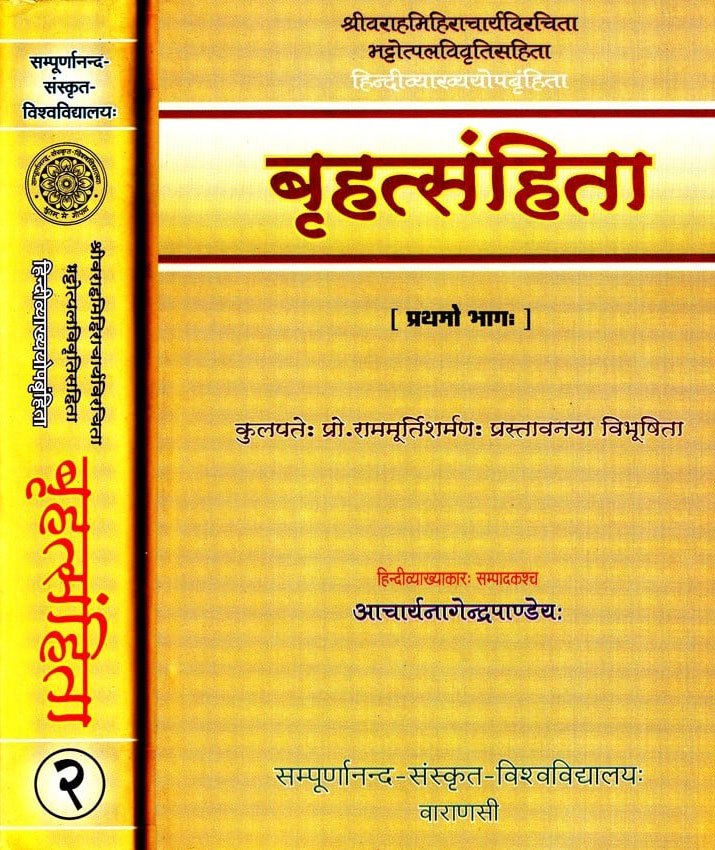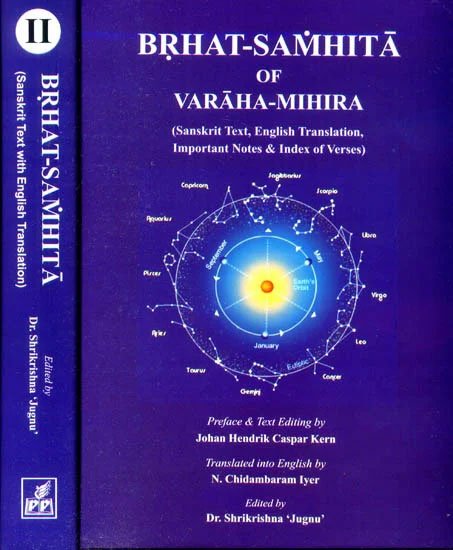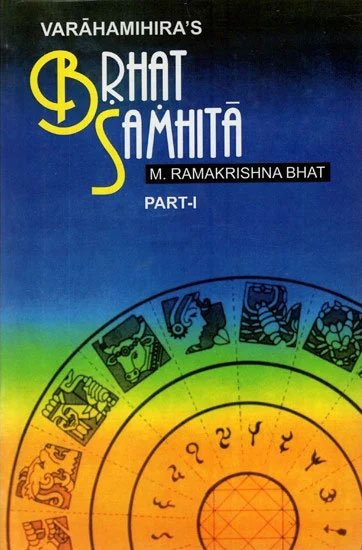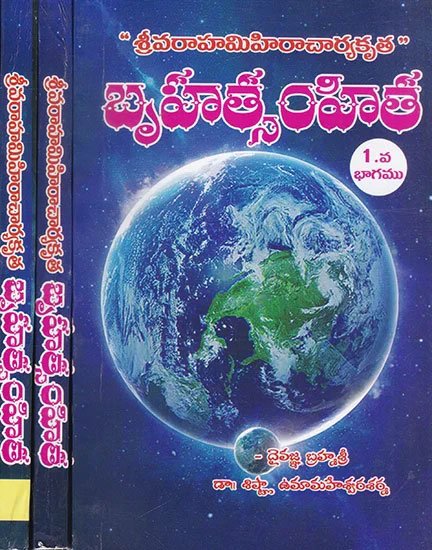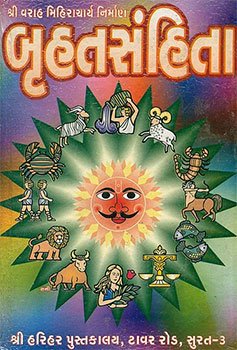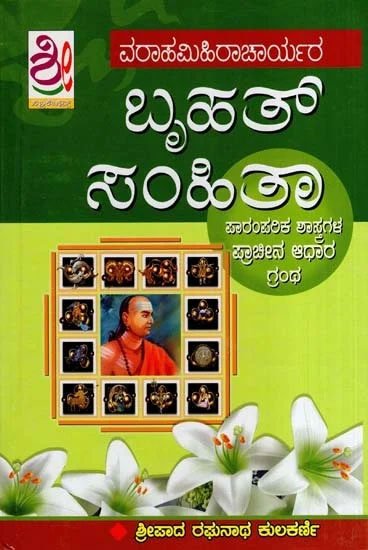Brihat-samhita [sanskrit]
26,560 words
The Sanskrit text of the Brihat-samhita from the 6th-century authored by Varaha Mihira in present-day Ujjain, India. It primarily deals with astrology and astronomy but is presented as an encyclopedia of knowledge.
Verse 50.2
स्थानं पुष्पसुहासिभूरिफलभृत्सुस्निग्धकृत्तिच्छदासत्पक्षिच्युतशस्तसंज्ञिततरुच्छायोपगूढं समम् ।
देवर्षिद्विजसाधुसिद्धनिलयं सत्पुष्पसस्योक्षितं सत्स्वादूदकनिर्मलत्वजनिताह्लादं च सच्छाद्वलम् ॥ २ ॥
[सच्छाड्वलम्]
sthānaṃ puṣpasuhāsibhūriphalabhṛtsusnigdhakṛtticchadāsatpakṣicyutaśastasaṃjñitatarucchāyopagūḍhaṃ samam |
devarṣidvijasādhusiddhanilayaṃ satpuṣpasasyokṣitaṃ satsvādūdakanirmalatvajanitāhlādaṃ ca sacchādvalam || 2 ||
[sacchāḍvalam]
The Sanskrit text of Verse 50.2 is contained in the book Brihata Samhita (Sanskrit Text with Hindi Translation) by Pandit Achyutananda Jha. This book is available online or you could buy the latest edition:
Read online Buy now! The Sanskrit text by Pandit Achyutananda Jha (2001)
Glossary of Sanskrit terms
Note: This extracts Sanskrit terms and links to English definitions from the glossary, based on an experimental segmentation of verse (50.2). Some terms could be superfluous while some might not be mentioned. Click on the word to show English definitions.
Sthana, Pushpa, Suhasin, Bhuri, Phalabhrit, Snigdha, Ccha, Cyuta, Shasta, Sanjnita, Tarucchaya, Upagudha, Samam, Sama, Dvija, Sadhusiddha, Nilaya, Satpushpa, Sasya, Ukshita, Sat, Sad, Udaka, Nirmalatva, Janitri, Janita, Ahlada, Shadvala,
Analysis of Sanskrit grammar
Note: this is an experimental feature and only shows the first possible analysis of the Sanskrit text (Verse 50.2). If the system was successful in segmenting the sentence, you will see of which words it is made up of, generally consisting of Nouns, Pronouns, Verbs, Participles and Indeclinables. Click on the link to show all possible derivations of the word.
- Line 1: “sthānaṃ puṣpasuhāsibhūriphalabhṛtsusnigdhakṛtticchadāsatpakṣicyutaśastasaṃjñitatarucchāyopagūḍhaṃ samam ”
- sthānam -
-
sthāna (noun, neuter)[adverb], [nominative single], [accusative single]
- puṣpa -
-
puṣpa (noun, masculine)[compound], [vocative single]puṣpa (noun, neuter)[compound], [vocative single]
- suhāsi -
-
suhāsin (noun, masculine)[compound], [adverb]suhāsin (noun, neuter)[compound], [adverb], [nominative single], [vocative single], [accusative single]
- bhūri -
-
bhūri (noun, masculine)[compound], [adverb]bhūri (noun, neuter)[compound], [adverb], [nominative single], [vocative single], [accusative single]bhūri (noun, feminine)[compound], [adverb]bhūrī (noun, masculine)[adverb], [vocative single]bhūrī (noun, feminine)[compound], [adverb], [vocative single]bhūrī (noun, neuter)[compound], [adverb], [nominative single], [vocative single], [accusative single]
- phalabhṛtsu -
-
phalabhṛt (noun, masculine)[locative plural]phalabhṛt (noun, neuter)[locative plural]
- snigdha -
-
snigdha (noun, masculine)[compound], [vocative single]snigdha (noun, neuter)[compound], [vocative single]√snih -> snigdha (participle, masculine)[vocative single from √snih class 1 verb], [vocative single from √snih class 4 verb]√snih -> snigdha (participle, neuter)[vocative single from √snih class 1 verb], [vocative single from √snih class 4 verb]
- kṛtti -
-
kṛtti (noun, feminine)[compound], [adverb]
- ccha -
-
ccha (noun, masculine)[compound], [vocative single]ccha (noun, neuter)[compound], [vocative single]
- dā -
-
dā (noun, feminine)[nominative single]dā (noun, masculine)[instrumental single]
- satpakṣi -
-
satpakṣin (noun, masculine)[compound], [adverb]
- cyuta -
-
cyuta (noun, masculine)[compound], [vocative single]cyuta (noun, neuter)[compound], [vocative single]
- śasta -
-
śasta (noun, masculine)[compound], [vocative single]śasta (noun, neuter)[compound], [vocative single]√śaṃs -> śasta (participle, masculine)[vocative single from √śaṃs class 1 verb]√śaṃs -> śasta (participle, neuter)[vocative single from √śaṃs class 1 verb]√śas -> śasta (participle, masculine)[vocative single from √śas class 1 verb]√śas -> śasta (participle, neuter)[vocative single from √śas class 1 verb]
- sañjñita -
-
sañjñita (noun, masculine)[compound], [vocative single]sañjñita (noun, neuter)[compound], [vocative single]
- tarucchāyo -
-
tarucchāyā (noun, feminine)[nominative single]
- upagūḍham -
-
upagūḍha (noun, masculine)[adverb], [accusative single]upagūḍha (noun, neuter)[adverb], [nominative single], [accusative single]upagūḍhā (noun, feminine)[adverb]
- samam -
-
samam (indeclinable)[indeclinable]sama (noun, masculine)[adverb], [accusative single]sama (noun, neuter)[adverb], [nominative single], [accusative single]samā (noun, feminine)[adverb]
- Line 2: “devarṣidvijasādhusiddhanilayaṃ satpuṣpasasyokṣitaṃ satsvādūdakanirmalatvajanitāhlādaṃ ca sacchādvalam || 2 |”
- devarṣi -
-
devarṣi (noun, masculine)[compound], [adverb]
- dvija -
-
dvija (noun, masculine)[compound], [vocative single]dvija (noun, neuter)[compound], [vocative single]
- sādhusiddha -
-
sādhusiddha (noun, masculine)[compound], [vocative single]sādhusiddha (noun, neuter)[compound], [vocative single]
- nilayam -
-
nilaya (noun, masculine)[adverb], [accusative single]
- satpuṣpa -
-
satpuṣpa (noun, masculine)[compound], [vocative single]satpuṣpa (noun, neuter)[compound], [vocative single]
- sasyo -
-
sasya (noun, masculine)[compound], [vocative single]sasya (noun, neuter)[compound], [vocative single]√sas -> sasya (absolutive)[absolutive from √sas]sa (noun, neuter)[genitive single]
- ukṣitam -
-
ukṣita (noun, masculine)[adverb], [accusative single]ukṣita (noun, neuter)[adverb], [nominative single], [accusative single]ukṣitā (noun, feminine)[adverb]√ukṣ -> ukṣita (participle, masculine)[accusative single from √ukṣ class 1 verb]√ukṣ -> ukṣita (participle, neuter)[nominative single from √ukṣ class 1 verb], [accusative single from √ukṣ class 1 verb]
- satsvā -
-
sat (noun, masculine)[locative plural]sat (noun, neuter)[locative plural]sad (noun, masculine)[locative plural]sad (noun, neuter)[locative plural]
- ād -
-
āt (indeclinable particle)[indeclinable particle]a (noun, masculine)[adverb], [ablative single]
- ūdaka -
-
ūdaka (noun, masculine)[compound], [vocative single]ūdaka (noun, neuter)[compound], [vocative single]
- nirmalatva -
-
nirmalatva (noun, neuter)[compound], [vocative single]
- janitā -
-
janita (noun, masculine)[compound], [vocative single]janita (noun, neuter)[compound], [vocative single]√jan -> janita (participle, masculine)[compound from √jan]√jan -> janita (participle, neuter)[compound from √jan]janitṛ (noun, masculine)[nominative single]janitā (noun, feminine)[nominative single]√jan -> janita (participle, masculine)[vocative single from √jan class 10 verb], [vocative single from √jan]√jan -> janita (participle, neuter)[vocative single from √jan class 10 verb], [vocative single from √jan]√jan -> janitā (participle, feminine)[nominative single from √jan class 10 verb], [nominative single from √jan]√jan (verb class 1)[periphrastic-future active third single]√jan (verb class 2)[periphrastic-future active third single]√jan (verb class 3)[periphrastic-future active third single]√jan (verb class 4)[periphrastic-future active third single]
- āhlādam -
-
āhlāda (noun, masculine)[adverb], [accusative single]
- ca -
-
ca (indeclinable conjunction)[indeclinable conjunction]ca (noun, masculine)[compound], [vocative single]ca (noun, neuter)[compound], [vocative single]
- sacch -
-
sat (indeclinable)[indeclinable]sat (noun, masculine)[compound]sad (noun, masculine)[compound], [adverb], [nominative single], [vocative single]sad (noun, neuter)[compound], [adverb], [nominative single], [vocative single], [accusative single]sat (noun, neuter)[nominative single], [vocative single], [accusative single]
- śādvalam -
-
śādvala (noun, masculine)[adverb], [accusative single]śādvala (noun, neuter)[adverb], [nominative single], [accusative single]śādvalā (noun, feminine)[adverb]
- Cannot analyse 2
Other editions:
Also see the following editions of the Sanskrit text or (alternative) English translations of the Verse 50.2
Brhatsamhita with the Commentary of Bhattotpala
by Krishna Chandra Dwivedi (2016)
Publisher: Sampurnanand Sanskrit University; 1229 pages;
Buy now!
Brihat Samhita with the Commentary of Utpalapatimala of Yogisvara
by K. V. Sharma (2012)
Publisher: Rashtriya Sanskrit Sansthan, Janakpuri; 754 pages; ISBN-10; 8186111360; ISBN-13: 9788186111369
Buy now!
Brihat Samhita (Hindi Translation)
by K. V. Sharma (2002)
Publisher: Sampurnanand Sanskrit University; 2359 pages; ISBN-13: 9789387890008.
Buy now!
Brhat Samhita (English translation)
by N. Chidambaram Iyer (2022)
Publisher: Parimal Publication Pvt. Ltd.; 801 pages; Edited by Dr. Shrikrishna Jugnu; ISBN-10: 8171104215; ISBN-13: 9788171104215.
Buy now!
Brhat Samhita (English with notes)
by M. Ramakrishna Bhat (2010)
Publisher: Motilal Banarsidas Publishers Pvt. Ltd.; 1155 pages; ISBN-10: 8120810600; ISBN-13: 9788120810600.
Buy now!
Brhat Samhita (Telugu translation)
by Sishtla Umamaheswara Sharma (2020)
Publisher: Mohan Publications, Andhra Pradesh; 846 pages.
Buy now!Preview of verse 50.2 in Kannada sript:
ಸ್ಥಾನಂ ಪುಷ್ಪಸುಹಾಸಿಭೂರಿಫಲಭೃತ್ಸುಸ್ನಿಗ್ಧಕೃತ್ತಿಚ್ಛದಾಸತ್ಪಕ್ಷಿಚ್ಯುತಶಸ್ತಸಂಜ್ಞಿತತರುಚ್ಛಾಯೋಪಗೂಢಂ ಸಮಮ್ ।
ದೇವರ್ಷಿದ್ವಿಜಸಾಧುಸಿದ್ಧನಿಲಯಂ ಸತ್ಪುಷ್ಪಸಸ್ಯೋಕ್ಷಿತಂ ಸತ್ಸ್ವಾದೂದಕನಿರ್ಮಲತ್ವಜನಿತಾಹ್ಲಾದಂ ಚ ಸಚ್ಛಾದ್ವಲಮ್ ॥ ೨ ॥
[ಸಚ್ಛಾಡ್ವಲಮ್]
Brhat Samhita (Gujarati translation)
by - (2000)
Publisher: Shree Harihar Pustakalay, Surat; Author: Shri Varahamihira Acharya (શ્રી વરાહમિહીરાચાર્ય); 432 pages.
Buy now!Preview of verse 50.2 in Gujarati sript:
સ્થાનં પુષ્પસુહાસિભૂરિફલભૃત્સુસ્નિગ્ધકૃત્તિચ્છદાસત્પક્ષિચ્યુતશસ્તસંજ્ઞિતતરુચ્છાયોપગૂઢં સમમ્ ।
દેવર્ષિદ્વિજસાધુસિદ્ધનિલયં સત્પુષ્પસસ્યોક્ષિતં સત્સ્વાદૂદકનિર્મલત્વજનિતાહ્લાદં ચ સચ્છાદ્વલમ્ ॥ ૨ ॥
[સચ્છાડ્વલમ્]
Brhat Samhita (Kannada translation)
by Sripada Raghunatha Kulkarni (2021)
Publisher: Srinidhi Publications, Bangalore; 668 pages with illustrations.
Buy now!Preview of verse 50.2 in Kannada sript:
ಸ್ಥಾನಂ ಪುಷ್ಪಸುಹಾಸಿಭೂರಿಫಲಭೃತ್ಸುಸ್ನಿಗ್ಧಕೃತ್ತಿಚ್ಛದಾಸತ್ಪಕ್ಷಿಚ್ಯುತಶಸ್ತಸಂಜ್ಞಿತತರುಚ್ಛಾಯೋಪಗೂಢಂ ಸಮಮ್ ।
ದೇವರ್ಷಿದ್ವಿಜಸಾಧುಸಿದ್ಧನಿಲಯಂ ಸತ್ಪುಷ್ಪಸಸ್ಯೋಕ್ಷಿತಂ ಸತ್ಸ್ವಾದೂದಕನಿರ್ಮಲತ್ವಜನಿತಾಹ್ಲಾದಂ ಚ ಸಚ್ಛಾದ್ವಲಮ್ ॥ ೨ ॥
[ಸಚ್ಛಾಡ್ವಲಮ್]
![Brihat-samhita [sanskrit] - book cover](/uploads/a/Brihat-Samhita-Sanskrit.jpg)
